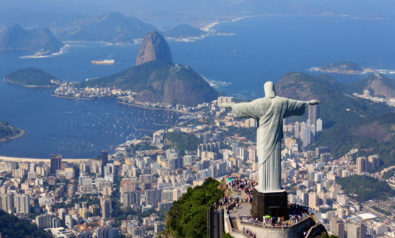
Brazil has not only taken a leading role in Latin America but continues its economic rise globally, already leaving behind well-established western economies.
Background
Just five years ago, the economy of the UK was more than three times larger than that of Brazil. But by 2011, the Brazilian economy had surpassed the UK as the world’s sixth largest. Over the next three years, Brazil is set to overtake France. By 2030, it is predicted that Brazil’s economy will eventually rise above Germany and Japan.
In the last ten years, 40mn poor Brazilian’s have joined the middle class, the minimum wage has risen by 60%, malnutrition and infant mortality are down to 73% and 45% respectively, poverty has fallen by a third, exports have grown four-fold and the overall economy is five times larger with 18mn new formal jobs.
Brazil’s economic rise has given the nation a bigger diplomatic profile, which it wields in Latin America and the world. In Latin America, Brazil is a regional power, fostering cooperation through a variety of major economic and diplomatic unions. In the world, Brazil serves as a model of successful development and has become a leader among developing countries, increasing aid and expanding its cultural presence.
What drove Brazil’s ascent and why is it relevant?
The combination of rising demand for Brazilian grains and minerals in Asia with effective social spending by the federal government, have propelled the Brazilian economy and allowed it to consolidate its gains.
Brazilian social policy presents an attractive middle ground between Chavez style handouts and strict free market austerity. Despite a doubling of social spending, Brazil maintains a budget surplus and low rates of inflation. Its policy approach has favored conditional programs that provide monetary incentives for good behavior. Most notably, the Bolsa Familia program transfers cash to poor families that keep their children in school, thus augmenting family income while encouraging personal investments in a more prosperous future. Other programs help ensure food security for these families by distributing food to the most needy and providing meals for children at school to reduce the burden preparing all meals from home.
Amidst assistance from the government, cash from expanding exports gave Brazilian firms more capital to expand their operations and workforces. Disposable income among Brazilian workers increased with more jobs, higher wages and social support, causing a boom in consumer spending, which further stimulated the economy. Effective social spending and export earnings have helped connect a greater percentage of the population with the country’s economic expansion.
Brazil’s rise epitomizes the emergence of new world powers in the 21st century. Among the BRIC countries, Brazil has the highest GDP per capita and the second largest economy. Brazil as a world power dedicated to development over control and influence and its call for accountability in humanitarian involvement represents a rethinking in global governance. Moreover Brazil leads by its own example. Brazil has consolidated one of the world’s most diverse democracies, given its size, while spreading recent economic gains in an equitable fashion. A little over half of the population identifies as afro-Brazilian, a group accounting for 70% of the 40mn new additions to the middle class.
But much remains unfinished. Brazil still suffers from high levels of income inequality with the majority of wealth concentrated in the South in addition to poor infrastructure and deficiencies in the education system. Perhaps the next decade will show progress in these areas to the extent of the previous one.
For more than 10 years, Fair Observer has been free, fair and independent. No billionaire owns us, no advertisers control us. We are a reader-supported nonprofit. Unlike many other publications, we keep our content free for readers regardless of where they live or whether they can afford to pay. We have no paywalls and no ads.
In the post-truth era of fake news, echo chambers and filter bubbles, we publish a plurality of perspectives from around the world. Anyone can publish with us, but everyone goes through a rigorous editorial process. So, you get fact-checked, well-reasoned content instead of noise.
We publish 2,500+ voices from 90+ countries. We also conduct education and training programs on subjects ranging from digital media and journalism to writing and critical thinking. This doesn’t come cheap. Servers, editors, trainers and web developers cost money.
Please consider supporting us on a regular basis as a recurring donor or a sustaining member.
Support Fair Observer
We rely on your support for our independence, diversity and quality.
Will you support FO’s journalism?
We rely on your support for our independence, diversity and quality.









